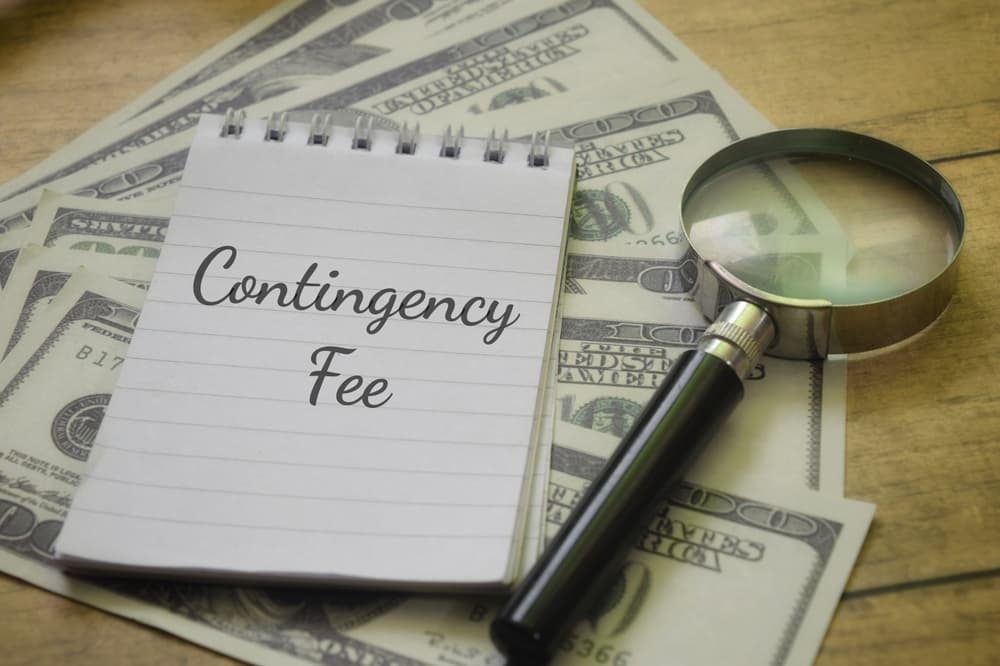Navigating a legal matter can be costly and overwhelming, especially when paying for legal services. Money can often be tight when you have suffered an injury in an accident, and you will have to stretch your limited resources in many directions. You might have to pay some share of accident-related expenses upfront, and even though you may later receive reimbursement from a settlement or jury award later on, there is no guarantee.
Your medical providers will require payment, and these expenses can be thousands or even more. People who suffer personal injuries often have mounting debts for months or years due to medical treatment, rehabilitation, and related needs. At the same time, you may not have money coming in if you are not working. If you have suffered a severe injury, you may miss considerable time from your job or be unable to work.
All of this creates a stressful financial situation. Simply stated, there may be no available funds, and you may have to make whatever existing money you have stretch as far as possible.
While you might know that hiring a personal injury lawyer in Vero Beach is the right move to get full compensation, how will you afford legal fees in your already dire situation?
Schedule A Consultation Today!
Your Money Fears Should Not Keep You from Getting Legal Help

The last thing you may have money for is a personal injury attorney. You may be afraid that you will have to use the last of your available funds to foot legal expenses if you want to try to obtain financial compensation for your injuries. Some people may even avoid hiring a lawyer because of their perceptions about the legal system and its workings. They may have heard that certain lawyers will ask for a retainer of thousands of dollars upfront for hourly charges. Then, the lawyer will ask you to pay an additional retainer when the prior one runs out.
Hiring a lawyer may seem like an additional financial burden when facing a legal issue. You do not have to worry about any of this when you have suffered a personal injury and want to file a claim or lawsuit. The legal system anticipates that many potential claimants and plaintiffs will already deal with financial difficulties and have limited money to pay legal bills. The system wants to make justice available to everyone, not just accident victims who already have the money to pay legal bills.
Thus, there is a unique way that personal injury lawyers get paid when you hire them for your case. Many attorneys work on a contingency fee basis, meaning you don't have to pay any upfront fees to hire a lawyer. Instead, the attorney will only collect a fee if they successfully resolve your case.
You Can Always Get a Free Initial Consultation with an Attorney

The first step in the legal process is to schedule an initial consultation with a personal injury lawyer. You will have a phone call, teleconference, or in-person meeting with a lawyer, where they will discuss your case and learn more about you. The initial consultation never costs you anything. Lawyers are pleased when you walk through their door, and they want to give you an initial read-out of your case. They want to represent you if you have a viable claim because they can make money themselves.
Once you hire an attorney, you will sign a representation agreement. The representation agreement contains the nuts and bolts of the contingency fee agreement you enter with your attorney.
When your lawyer’s fee is contingent, it depends on another event happening first. In a personal injury case, the event that must happen is your lawyer successfully obtaining financial recovery for you.
There is Never a Guarantee You Will Win a Personal Injury Case
Here, the contingency is that you win your case, and it is not definite that you will win. Winning does not necessarily mean taking your case to a jury and getting a jury award; winning can be receiving money for your case in any way. More commonly, winning means that you have negotiated an agreement and received a settlement check. If you win your case, you take on a legal obligation to pay your attorney anything for their services.
Your attorney’s compensation does not depend on the amount of time that they spent on the case. Instead, the representation agreement lays out percentages of the proceeds that your lawyer receives should you win your case. The specifics are unique to each agreement, but some amounts are close to industry standards.
Your Personal Injury Attorney Gets a Percentage if You Win Your Case
There are different percentages that your lawyer gets when you settle a case versus taking it to court and winning. The percentage they get for a settlement should be lower than what they would receive for trial because it presumably requires less work. Still, your attorney will need to put in much effort for many settlements because it still takes some degree of battling the insurance company.
Customarily, your lawyer gets paid around 33 ⅓ percent of the proceeds of your case if you reach a settlement agreement. Some firms may ask for slightly more, while some may take less. If your case goes to trial, you can expect to pay your attorney around 40 percent of the proceeds. The reason why your lawyer gets more is because:
- They are putting in more time to prepare for the trial.
- Your attorney may put in a large amount of effort and still come away empty-handed.
- Higher fees and costs are associated with cases that go to trial (in some cases, your lawyer advances the expenses related to a trial, and they may cover them entirely).
- There Are Some Restrictions on What the Lawyer May Charge You
Your lawyer cannot charge anything they want as a contingency fee. The Rules of Professional Conduct require attorneys to charge reasonable fees. Specifically, the rules state:
“A lawyer shall not make an agreement for, charge, or collect an unreasonable fee or an unreasonable amount for expenses.”
What is reasonable depends on several factors laid out in the rules. Of course, one of the factors is “the time and labor required, the novelty and difficulty of the questions involved, and the skill requisite to perform the legal service properly.”
Of course, your attorney does not have to cut their fee if the case ends up taking them less time than they initially anticipated. Nonetheless, the notional fee amount must be reasonable when you sign the agreement, and you should always know your attorney’s fee before signing. This document is a binding contract between you and the lawyer that each side must observe.
You Can Check with Multiple Injury Lawyers to Learn About Their Fees

If you think an attorney’s fee may be high, you should check with several lawyers to see what they charge as a contingency fee. The attorney with the lowest cost is not necessarily the best one. You can pay your attorney less but also end up with less money because the lawyer lacks skill and aggressiveness. Nonetheless, you want to know that the fee is in the right ballpark before you sign the agreement. You might be unable to get your money back if the attorney charged you too much, even if they eventually face disciplinary charges.
Different attorneys handle other fees associated with your case in various ways. Some lawyers may cover court fees and administrative expenses out of their own pockets. They may not deduct it from the proceeds of your case if you win. Other lawyers may recoup these fees from your settlement, should you receive one.
The Representation Fee Must Be Clearly in the Agreement
The critical thing to remember is that nobody can charge you anything unless it is spelled out ahead of time in the contract between you and the attorney. The agreement must be very explicit about fees, and there can be no ambiguities. The lawyer cannot change the contract after the fact to reflect fees.
Now, consider what may happen if you do not win your case. While losing your case is bad news, your situation will not be any worse with a large legal bill. When you walk away empty-handed, your attorney does so as well. You and your lawyer are in it together, and they will get nothing, even if they spend hundreds of hours on your case. For your lawyer, that time then becomes a sunk cost. They have spent time on your case, which they could have devoted to other legal matters that may have paid them money. That is the risk they take when they take on your case.
Personal Injury Attorneys Will Not Accept Every Prospective Client
The contingency fee system means that your attorney will pay a great deal of attention to the merits of your case before they agree to work with you. There is always a chance that a lawyer will review your case and decide that they do not want to take it. Your lawyer is also taking a risk because of the nature of the contingency fee system, as there is always a chance that they may earn nothing for their time. A lawyer has limited hours to go around, and they do not want to spend their time on cases they suspect will not pay them any money. Expect a reasonable amount of scrutiny during the free consultation so the attorney can learn the possible strength of your case. Once your attorney agrees to represent you, they will work for the duration of the case with limited exceptions.
Your Injury Lawyer Does Not Get Paid Until You Win Your Case
If and when you win your case, your lawyer will get paid, but they will not get a penny before that point. Your settlement check or case proceeds will initially go to your attorney’s escrow account. Here, various parties may need to receive payment first before you can get a check. For example, medical providers and health insurance companies may have a lien on your settlement so they can get paid back money that they have already spent or that you owe them. At the same time, your lawyer will also receive their percentage of the proceeds of your case before the check then goes to you. Only after everyone else gets reimbursed will you receive your payment.
You Usually Have Less of a Chance of Winning Without a Personal Injury Attorney
Meanwhile, your attorney performs crucial tasks in your case that make their services more than worth the money they receive. Without an attorney by your side, you may not even qualify for financial compensation in the first place. Your lawyer will gather proof of what happened to show that the other party was negligent and has a legal obligation to pay you.

Then, your lawyer will research your individual situation to determine how much you may be due in damages. They will present that amount in a claim to the insurance company or in a lawsuit in court for a jury to decide.
At that point, your attorney’s efforts will turn towards getting you enough money in a settlement agreement. They may need to put the screws to the insurance company through hardball negotiation tactics or even by using potential litigation as a stick. The goal is to persuade the insurance company to pay in a settlement agreement. Eventually, insurance companies will see that you and your lawyer mean business and may get in the same ballpark as you in settlement negotiations. However, until you hire an attorney, the insurance company will see no reason to take you seriously.
Remember, with a contingency fee arrangement, you have the peace of mind of knowing that you can pursue your legal rights without any out-of-pocket expenses. The financial risk is shifted from you to the attorney, allowing you to focus on your case and obtaining the justice you deserve.
So, if you're facing a legal issue but are concerned about the cost, contact a personal injury attorney who offers their services on a contingency fee basis. It is often the best way to protect your rights and pursue the compensation you deserve.
